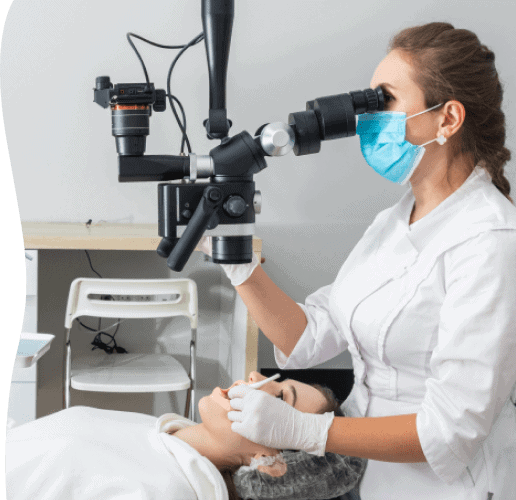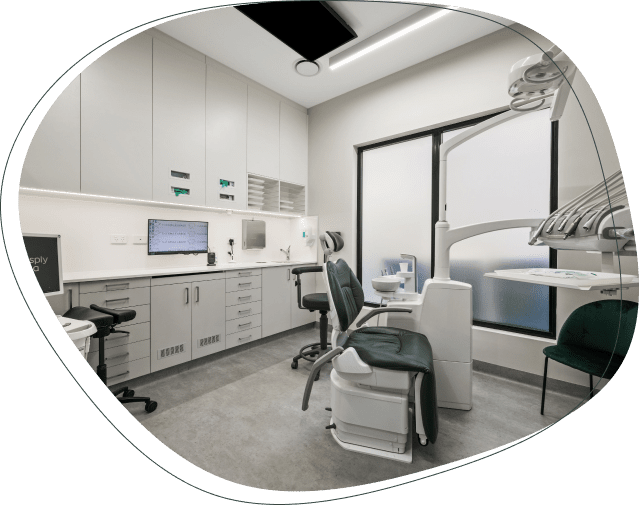Gum Disease Treatment in Sutherland


Protect your Oral Health with our Gum Disease Treatment.
Gum disease, also called periodontal disease, destroys the soft tissue and the bone that supports the teeth. It is usually caused by a bacterial infection and, if left unmanaged, can lead to tooth loss. Gum disease treatment can help reverse the damage caused by gum disease.
At The Smile Space, we are passionate about helping patients achieve and maintain healthy teeth and gums. That’s why we offer periodontal disease treatment in Sutherland. Gum disease treatment usually involves a deep cleaning of the teeth and gums, followed by a course of antibiotics. In severe cases, surgery may be necessary to remove the infected tissue.
If you think you might have gum disease, please schedule an appointment at The Smile Space. Early diagnosis and treatment can help prevent the progression of the disease and protect your oral health.
Advantages Of Gum Disease Treatment
Gum disease is a potentially dangerous condition. If not addressed, it can lead to several problems, including bad breath, tooth loss, and even heart disease. However, gum disease is reversible if caught early, and there are many advantages to seeking periodontal disease treatment in Sutherland. The sooner you get started, the better off you’ll be.
Pain Relief
Gum disease is caused by dental plaque build-up, a sticky film of bacteria that forms on teeth. Dental plaque irritates the gums, causing pain, inflammation, and tenderness.
As gum disease progresses, the gums can pull away from the teeth, creating pockets of bacteria and pus. It can cause intense pain and swelling. Fortunately, gum disease therapy in Sutherland can help reduce inflammation and promote healing, significantly reducing discomfort or pain.


Elimination of bad breath
Bad breath, also called halitosis, can be an embarrassment. It’s caused by bacteria that build up in your mouth, especially in your gums if you have gum disease. These bacteria create sulphur compounds that smell unpleasant.
If you have gum disease, these pockets of bacteria can become especially smelly. Luckily, periodontal treatment can help eliminate bad breath. By removing the bacteria and food particles that cause the odour, you can achieve long-lasting fresh breath.
Healthy gums
Gum disease is an infection that can lead to bleeding gums and gum recession. This infection can damage the gum tissue and even lead to tooth loss. Bleeding gums are usually the first indication of gum disease.
Gum recession, another common side effect of gum disease, is when the gum tissue begins to draw back from the teeth, leaving the tooth roots unprotected. Gum disease treatment in Sutherland can help prevent these problems.


Prevention of more serious health problems
Gum disease is a serious condition. Aside from dental health issues like tooth loss, gum disease can lead to several other health concerns if ignored. For example, gum disease has been linked to heart disease, diabetes, lung disease, stroke, and pregnancy complications.
Luckily, some dental procedures can help prevent these more serious health problems from developing. By getting treatment for your gum disease, you can keep your whole body healthy.
Get Outstanding Dental Care with Us Today
At The Smile Space, we believe that comprehensive dental care should be accessible to everyone. Our experienced team is dedicated to providing the highest standard of care, using the latest technology and techniques. If you're looking for a dentist in Sutherland, book an appointment at The Smile Space today!

Why Choose
The Smile Space
 Warm, Friendly, and Highly Experienced Dental Team
Warm, Friendly, and Highly Experienced Dental Team
 We are Your One-Stop Shop For All Your Dental Needs
We are Your One-Stop Shop For All Your Dental Needs
 Modern and State-of-the-Art Dental Technology
Modern and State-of-the-Art Dental Technology
 We Accept All Health Funds and Offer Quick and Easy Claims Through HICAPS
We Accept All Health Funds and Offer Quick and Easy Claims Through HICAPS

Frequently Asked Questions
About Gum Disease Treatment
What causes gum disease?
Bacteria and poor oral hygiene are the main causes of gum disease. Gum disease occurs when plaque – a sticky film composed mainly of bacteria – forms on teeth.
When dental plaque is not removed through brushing and flossing, it accumulates and hardens, turning into tartar. Tartar can only be removed through professional teeth cleaning. If dental plaque and tartar are not removed, they can lead to gum disease. They contain bacteria that produce toxins that can irritate the gums and cause inflammation.
What happens if I don’t manage my gum disease?
Gum disease is a serious condition that, if left unmanaged, can lead to tooth loss. Furthermore, the bacteria may enter your bloodstream through your gum tissue, causing further health problems.
Several studies have found evidence linking gum disease to diabetes, heart disease, and pregnancy complications. Therefore, daily tooth brushing and flossing are important to prevent gum disease. It is also recommended to visit your dentist regularly for dental examinations and regular hygiene treatments.
How will my dentist manage my gum disease?
Dentists manage gum disease using various methods, depending on its severity. For patients with early-stage gum disease or gingivitis, simple dental cleaning and scaling may be all that is necessary to remove the bacteria and tartar that have built up on the teeth. In some cases, patients may require deep dental cleanings.
Antibiotic therapy may also be necessary to destroy the bacteria causing the infection. For advanced-stage gum disease or periodontitis, more aggressive treatment of gum disease may be necessary. It could involve surgical gum disease treatments such as a pocket reduction procedure (flap surgery) or bone grafting.
Is gum disease a serious dental issue?
Gum disease is a serious dental issue. It can lead to the loss of natural teeth and other health problems. Without dental treatment, gingivitis (a mild form of gum disease) can progress to periodontitis, a more serious form of gum disease.
Periodontitis can damage the bone and connective tissue that support the teeth, eventually leading to tooth loss. In addition, periodontal disease has been linked to several other health problems, including heart disease, stroke, and diabetes.


